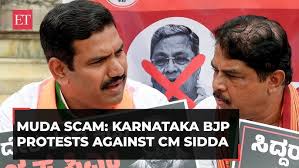DK Shivakumar’s Assertion on Siddaramaiah’s Continuation as Chief Minister Amid MUDA Scam Allegations: A Political Analysis
In the landscape of Karnataka politics, the recent statement by DK Shivakumar, the Deputy Chief Minister of Karnataka, asserting that Siddaramaiah will continue as the Chief Minister despite the BJP’s demands amidst the Mysuru Urban Development Authority (MUDA) scam, underscores the intense political maneuvering that characterizes the state’s governance. The MUDA scam, which has become a focal point for opposition criticism, has raised questions about accountability, transparency, and the interplay of political power in Karnataka. This essay delves into the implications of Shivakumar’s assertion, the BJP’s demands, the nature of the MUDA scam, and the broader political context.
Table of Contents

The Political Assertion: DK Shivakumar’s Stance
DK Shivakumar, known for his political acumen and strong influence within the Karnataka Congress, made a definitive statement that Siddaramaiah would remain the Chief Minister, brushing aside the BJP’s demands. His assertion is not merely a defense of Siddaramaiah but also a clear signal of the Congress party’s united front in the face of the opposition’s allegations. Shivakumar’s statement reflects the internal dynamics of the Congress party, where any perceived instability could be detrimental to their governance in Karnataka. By publicly supporting Siddaramaiah, Shivakumar aims to project an image of cohesion and stability within the ruling party, which is crucial for maintaining public confidence and political control.
BJP’s Demand: Political Strategy or Genuine Concern?
The BJP’s demand for Siddaramaiah’s resignation or at least a serious investigation into the MUDA scam is a calculated political move. The BJP, which has been in the opposition since losing power in the 2023 Karnataka Assembly elections, is keen on capitalizing on any opportunity to destabilize the Congress-led government. By focusing on the MUDA scam, the BJP is attempting to project the Congress government as corrupt and incapable of governance. The demand for Siddaramaiah’s resignation is not just about the specific allegations related to the MUDA scam but also about creating a narrative that the Congress leadership in Karnataka is embroiled in corruption, thereby weakening their moral authority to govern.
The MUDA Scam: Allegations and Political Ramifications
The MUDA scam, which has been the center of the controversy, involves allegations of irregularities in land allotment and illegal conversions of agricultural land to non-agricultural land in Mysuru. The allegations suggest that influential people, possibly with political connections, have been involved in these irregularities, leading to significant financial losses to the state exchequer and unfair advantages to certain individuals or entities.
The scam has significant political ramifications. For the ruling Congress party, it presents a challenge to its image of clean governance. The opposition’s focus on the scam has the potential to erode public trust, especially if the allegations are substantiated. For the BJP, the scam is an opportunity to highlight governance failures and to position themselves as a viable alternative in the next elections.
The Broader Political Context: Stability vs. Accountability
The issue of Siddaramaiah’s continuation as Chief Minister cannot be viewed in isolation. It is part of a broader political context where stability in governance is often weighed against the need for accountability. The Congress party, by backing Siddaramaiah, is prioritizing stability, arguing that any change in leadership or major disruption could weaken the government’s ability to deliver on its promises. On the other hand, the BJP is framing the issue as one of accountability, arguing that a Chief Minister under the cloud of a scam cannot be trusted to govern effectively.
This tension between stability and accountability is a recurring theme in Indian politics. Governments often argue that opposition demands for accountability are politically motivated and that these demands, if met, would lead to instability. Conversely, oppositions argue that without accountability, governments cannot claim legitimacy. The MUDA scam controversy is a microcosm of this larger debate.
Public Perception and Electoral Implications
Public perception plays a crucial role in the outcome of political controversies. While political elites debate the finer points of stability and accountability, the public often perceives these issues through the lens of trust and credibility. If the Congress government, particularly Siddaramaiah, is seen as evading accountability, it could lead to a loss of public trust, which would be detrimental in future elections. On the other hand, if the BJP is seen as opportunistically exploiting a controversy for political gain, it could backfire, especially if the allegations do not hold up to scrutiny.
Electoral implications are always at the forefront of political strategies. The manner in which the MUDA scam is handled, both by the Congress in defending Siddaramaiah and by the BJP in attacking him, will have significant implications for the next Assembly elections. If the Congress can effectively counter the BJP’s narrative and demonstrate a commitment to transparency, they could mitigate the damage. Conversely, if the BJP can keep the issue alive and continue to raise doubts about Siddaramaiah’s leadership, it could give them a significant advantage.
Conclusion: The Road Ahead
DK Shivakumar’s assertion that Siddaramaiah will continue as Chief Minister is a clear indication of the Congress party’s strategy to maintain a united front in the face of BJP’s demands amidst the MUDA scam controversy. The political tussle over Siddaramaiah’s continuation is emblematic of the broader struggle between stability and accountability in Indian politics. As the situation unfolds, both the Congress and the BJP will need to navigate the complexities of public perception, legal scrutiny, and electoral strategy. The outcome of this controversy will not only shape the immediate future of Karnataka’s political landscape but also offer insights into the dynamics of governance and opposition in Indian democracy.







